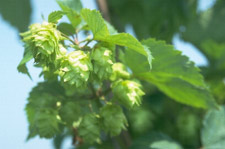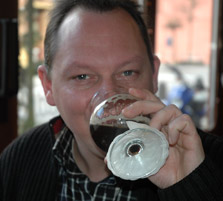Dear Abby:
I love hops, but my local brewpub is currently serving an IPA dry hopped with Simcoe and I’m wondering if it is polite to tell the brewer his beer smells a bit too much like a litter box badly in need of cleaning.
Yours truly,
A Hophead
I didn’t mail the letter. Not only because I made the part up about the local brewpub, but because there’s already enough hops bashing going on these days.
In November Lew Bryson wrote:
But there’s just so much more to the whole beer palate than the variety of flavors available from hops, and the enthusiasts, the people who should be reaching out to the future craft beer drinkers, largely aren’t getting it. They’re impassioned about the one flavor/aroma component of beer that is least likely to entrance newcomers: bitterness. Their passion is beautiful, but so narrow. Love beer, not just hops.
And this month, in his predictions for 2006, Stephen Beaumont began:
Although hops, hops and more hops will continue to be the dominant theme in American craft brewing, I suspect that by September or so, a mild case of “repetitive bitterness disorder” will set in, bringing with it a new appreciation for less “extreme” styles of beer, like British-style best bitter, suitably hopped with Challenger, Fuggles and/or Goldings hops, and Bavarian helles and weisse.
 These aren’t some crazy hop-fearing wimps – they’ve been seen in public enjoying an over-the-top hoppy beer. (Beaumont wrote this about Russian River’s Pliny the Younger: “If this is a triple IPA, then I’m all for the further development for the style. Hell, let’s start a I3PA beer fest!”) They are reasonable and well-read commentators standing up for balance in beer.
These aren’t some crazy hop-fearing wimps – they’ve been seen in public enjoying an over-the-top hoppy beer. (Beaumont wrote this about Russian River’s Pliny the Younger: “If this is a triple IPA, then I’m all for the further development for the style. Hell, let’s start a I3PA beer fest!”) They are reasonable and well-read commentators standing up for balance in beer.
Their points are well made, particularly when Bryson begins with a defense of the Bryan Pearson’s malt-accented beers at Church Brew Works. But I’m not ready to jump on the less-hops-is-better bandwagon for the simple reason that hop obsession has been one of the cornerstones of the American beer renaissance.
American brewers used hops – starting with Anchor Brewing more than 30 years ago – to make it clear their beers would be something other than imitative of European classics.
But they haven’t received as much credit for innovation as American wineries. Paul Lukacs frequently praises American innovation in The Great Wines of America, for instance writing this about John Alban of Alban Vineyards in California:
“Like so many American winemakers of his generation, he has learned to do more than mimic the practices observed abroad, so as to be able to fashion wines that taste individualistic rather than imitative.”
It’s not only that American brewers are willing to make beers more bitter than ever they’ve explored what happens to flavor and aroma when they use new varieties of hops and different methods in brewing with hops.
They’ve done this at a time when the German Hop Trade Association calculates the average amount of hops used in each hectoliter of beer produced worldwide continues to decrease. Blame the brewers of international lagers for much of that, but it’s happening to more beers than just the ones we label industrial.
For instance, other German brewers rushed “gold” beers to the market after Beck’s Gold proved to be a roaring success. All are sold in trendy clear bottles and are lighter than traditional Munchner Helles. For instance Paulaner Hell Gold is 4.5% abv and the bitterness units (IBU) are measured at 15, while the Paulaner Original Munchner Hell (known as Premium Lager in the U.S) is 4.9% and 20 IBU.
Spaten even lowered the bittering for its Munchner Hell (known as Spaten Premium Lager in the states) from 25 IBU to 20. “People come to Munich expecting a smoother beer,” said Josef Ernst, who was in charge of brewing at Spaten until recently.
Hopping levels are diminishing in beers we don’t even consider hoppy, like the “abbey” styles of Belgium. “The style has gotten smoother and/or sweet,” said Belgian beer enthusiast Carl Kins, who judged at the last two Great American Beer Festivals. “Actually, most breweries try to follow the market leader (Leffe) and make a beer that has less character so as to appeal to a larger market.”
 Marc Limet (pictured) of Brouwerij Kerkom, a farmhouse brewery in the countryside south and east of Brussels, is more outspoken. “There used to be 50 beers that made you go, like, ‘Whoa!’ and now you can count them on two hands,” he said. “Everybody brews beer to sell. We have to sell beer, but my problem I have with some other brewers is they are brewing nine to ten beers, and everything is the same. The good things all get thrown overboard, and the bad stays. That is what has happened with hops. I miss that little bitterness that makes it a beer.”
Marc Limet (pictured) of Brouwerij Kerkom, a farmhouse brewery in the countryside south and east of Brussels, is more outspoken. “There used to be 50 beers that made you go, like, ‘Whoa!’ and now you can count them on two hands,” he said. “Everybody brews beer to sell. We have to sell beer, but my problem I have with some other brewers is they are brewing nine to ten beers, and everything is the same. The good things all get thrown overboard, and the bad stays. That is what has happened with hops. I miss that little bitterness that makes it a beer.”
Limet took the opportunity to make a statement when he brewed a special beer for a local cafe, calling it Boecht van den Afgrond. “It means ‘rubbish from the abyss,’ “ Limet said, and the name designed to taunt drinkers who don’t care for hops. He calculates the beer’s IBUs at 50.
“It’s meant to fight the sweet beers,” he said.
This is not to imply Limet is the only continental brewer willing to experiment with hops, or to just plain experiment. For instance, we can hardly wait to taste what Cantillon does with the large package of Amarillo hops Sam Calagione of Dogfish Head Brewery is sending in connection with the trip he and other brewers are making to Belgium.
And let’s give Beaumont credit for following his first prediction with this one:
In British brewing, on the other hand, I expect that more and more brewers will discover how much fun it is to play with American hops like Cascade and Centennial, much to the dismay of CAMRA traditionalists across the land.
Consider this: Centennial hops would have died in infancy were it not for American brewers (and Ralph Olson of Hopunion).
The point is that Americans aren’t just throwing more hops into their beers – OK, some are and the results sometimes suck – and that ultra hoppy beers pave the way for complexly hoppy beers.
Stan, Stan, where did I say “less hops is better”? I don’t believe I even said that fewer hoppy beers would be better. I realize you’re exaggerating my stand on this issue in order to jump off on your own rant, but… Given how the geek community already stands on this, your plea for hops justice rings a bit like Rush Limbaugh pleading that conservatives don’t control enough of talk radio. All I’m asking for is people to consider malt-balanced beers, to give them the credit I do believe they deserve, particularly when a brewer as innovative and talented as Bryan Pearson is working with those malty beers…and getting very little respect in the geek community for it.
As you did say, I love hoppy, madly hoppy, and ridiculously hoppy beers. But I’m bored to absolute distraction by the amount of obsessive attention they get.
Lew Bryson
Lew, it would be probably be more fun to disagree with you, but – other than bringing up Rush Limbaugh (can we ban the name from this blog?) – your argument is perfectly reasonable, particularly since it starts and continues to the end (read Lew’s whole article, folks) defending Bryan’s beers.
I’d say we both did some overstating to make our points. In my case I made up the idea you were “hops bashing” so I could defend permitting occasional excess in the quest of knowledge.
You’re arguing for grace, harmony, subtly and balance in beers. I don’t want to be on the other side of the debate in that one.
Perhaps us folks in the invsible (Mountain) time zone have moved on. We consider a hophead somebody who loves hops at all low alpha levels as well as high – and we’re not shy about bad mouthing wacko out-of-balance beers.
We wouldn’t argue for a dunkel with more bitterness or hop aroma/flavor but that doesn’t mean a hophead couldn’t use recently acquired knowledge to make subtle and pleasant changes in character (just as a malthead would with grains).
Not surprisingly, Stan, I agree with Lew’s position that neither of us was bashing hops, just hops obsession. Moreover, I agree with your positioning of American brewers (in general) as innovators, a subject on which I expounded last November in United’s in-flight magazine, Hemispheres. (Sorry, I just checked and it’s not online yet.)
My issue is that balance in beer, as in most elements of food and drink, is vital to the creation of a great beverage. Just as a hot sauce that’s all heat and no flavour is more a measure of testosterone than taste, so is a beer that’s bitter as hell with no supporting malt character merely a test of lupulin tolerance. In the best of the double (and triple) IPAs, bitterness and strength is supported by malty complexity. That’s what makes them so good. At their worst, they’re just hop tonic.
Cheers,
S.